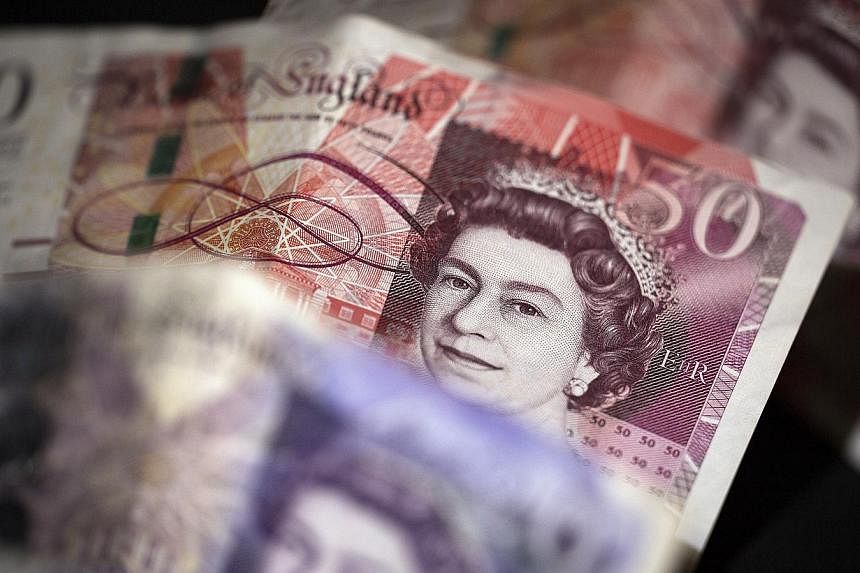LONDON (Bloomberg) - The British pound climbed the most in seven weeks as an exit poll indicated the Conservative Party was on track to lead a minority government after the U.K. election. Most Asian index futures rose, while crude oil held losses as investors awaited key data on the U.S. labor market.
Sterling jumped more than 0.9 per cent against the U.S. dollar and the euro, trading at US$1.5387 by 7:51 a.m. Tokyo time after touching its strongest level since April 30. Futures on equity gauges from Japan to Hong Kong advanced in most recent trading, while contracts on the Standard & Poor's 500 Index were little changed after the benchmark halted a two-day drop. U.S. crude was at US$59 a barrel following Thursday's 3.3 per cent retreat.

The poll gave the Conservatives 316 of the parliament's 650 seats, with the Labour Party trailing on 239 seats. Should the results bear out, Conservative leader David Cameron would win his second term as prime minister. While China posts trade data Friday, traders are anticipating the monthly U.S. payrolls report, which is seen as key to determining the likely timeline for higher interest rates in the world's largest economy.
"The market was expecting a messier, closer-run outcome in the exit poll," Daragh Maher, a foreign-exchange strategist at HSBC Holdings Plc in London, said by instant message. "The fact that it signaled a clear upside surprise for the Conservatives has helped the pound on two fronts. Perhaps the market was a bit short pound into the poll expecting a tight call, and now that is being unwound."
The pound added 1.3 per cent to 72.98 pence per euro, and gained against all 16 major peers tracked by Bloomberg.
In the run-up to the election, the Conservatives focused on their economic credentials, with opinion polls showing them to be the the most-trusted party on that subject. Even so, some investors voiced concern that the party's pledge to hold a referendum on Britain's membership of the European Union may undermine investment and hurt the pound. Results for individual seats will be announced through the night in the U.K.
The euro lost 0.3 per cent to US$1.1231 in a second day of declines.
New Zealand's NZX 50 Index, the first major stock gauge to start trading each day in the Asia-Pacific region, climbed 0.3 per cent, paring its drop in the week to 0.9 per cent. Futures on Australia's S&P/ASX 200 Index lost 0.1 percent following a two- day, 3.1 per cent slump in the measure. Gold slipped 0.7 per cent Thursday and Chinese prices for iron ore, Australia's biggest export, snapped a three-day rally.
Elsewhere in the futures market, contracts on the Nikkei 225 Stock Average were up 0.6 per cent to 19,360 by 3 a.m. in Osaka. Futures on the Japanese index traded on the Chicago Mercantile Exchange were little changed at 19,380 after gaining 0.2 per cent in the previous session.
Futures on Hong Kong's Hang Seng Index and the Hang Seng China Enterprises Index, a gauge of mainland stocks listed in the city, both increased 0.3 per cent. FTSE China A50 Index futures were also up 0.3 per cent in most recent trading, with the Shanghai Composite Index on track for its first weekly decline since the start of March.
U.S. employers probably added 228,000 workers to nonfarm payrolls in April, after a 126,000 increase in March, according to economists surveyed by Bloomberg. Federal Reserve policy makers are monitoring labor data to determine the timing of higher borrowing costs after economic growth slowed in the first quarter for reasons the central bank called "transitory."
Treasuries turned positive Thursday after a rout that erased more than US$400 billion from global bonds in two weeks. Yields on 10-year notes fell six basis points, or 0.06 percentage point, to 2.18 per cent for their first drop this week.
"We're seeing a rebound off some selling that took place recently," said Bill Schultz, who oversees US$1.2 billion as chief investment officer at McQueen, Ball & Associates. "The next trend will be set by whatever the employment numbers dictate."
Alibaba Group Holding Inc. jumped 7.5 per cent in New York after reporting a 45 per cent increase in quarterly revenue and replacing its chief executive officer. Yahoo! Inc., which owns a stake in the Chinese e-commerce company, gained 5.3 per cent. The S&P 500 added 0.4 per cent Thursday after losing 1.6 per cent over the previous two days.
Global equities are down about 1 per cent this week amid a selloff in government debt sparked by record-low yields in Germany that money managers have said appear unsustainable. At the same time, China's economy has slowed, leading to the biggest three-day slide in the country's stocks since June 2013, while a 51 percent rally in Brent crude since mid-January is adding to signs of inflation.

